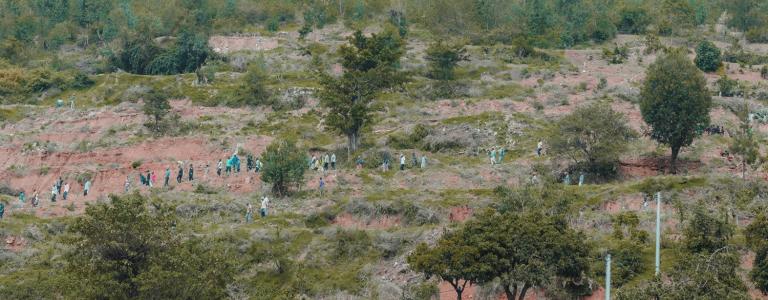SUNCASA in Kigali: Beyond planting trees
The City of Kigali and SUNCASA launched the “My Tree” campaign to promote tree sustainability and community ownership.
The City of Kigali, in collaboration with SUNCASA and its local partners, launched the ‘#IgitiCyanjye’ (#MyTree) community tree planting campaign on October 26, with the goal of ensuring the long-term sustainability of trees planted across the city. In Kigali, SUNCASA aims to restore the Nyabarongo River catchment through gender-responsive nature-based solutions, reducing flash floods, landslides, and erosion risks to enhance the resilience of 975,000 residents.
As part of Rwanda’s monthly Umuganda community service, the campaign engages residents, organizations, and the broader community to ensure the long-term sustainability of trees planted throughout Kigali, encouraging shared responsibility for their care and maintenance. The October event also marked the community launch of SUNCASA in the districts of Kicukiro, Nyarugenge, and Gasabo. Hundreds of residents gathered at the three sites to participate in the community work, planting around 9,200 trees. The City of Kigali expects to plant 3 million trees in 5 years. SUNCASA will be pivotal in achieving this goal, as the project seeks to collaborate with 2 million new trees planted to restore the Nyabarongo River catchment.
Speaking at the event, Lord Mayor of Kigali Samuel Dusengiyumva underscored the importance of the partnership with SUNCASA and community-driven environmental initiatives, stating, “What we are doing with the ‘My Tree campaign,’ Igiti Chanje, is to encourage citizens to go beyond planting trees to ensure that the trees that we plant, we take care of them, we ensure that they grow so that they can serve the purpose.”
“Together with the SUNCASA project, we are aiming to plant 2 million trees within only 3 years or 2 years to come. The SUNCASA project is a perfect match with the city plan to become a city in the forest,” remarked Lord Mayor Samuel Dusengiyumva.
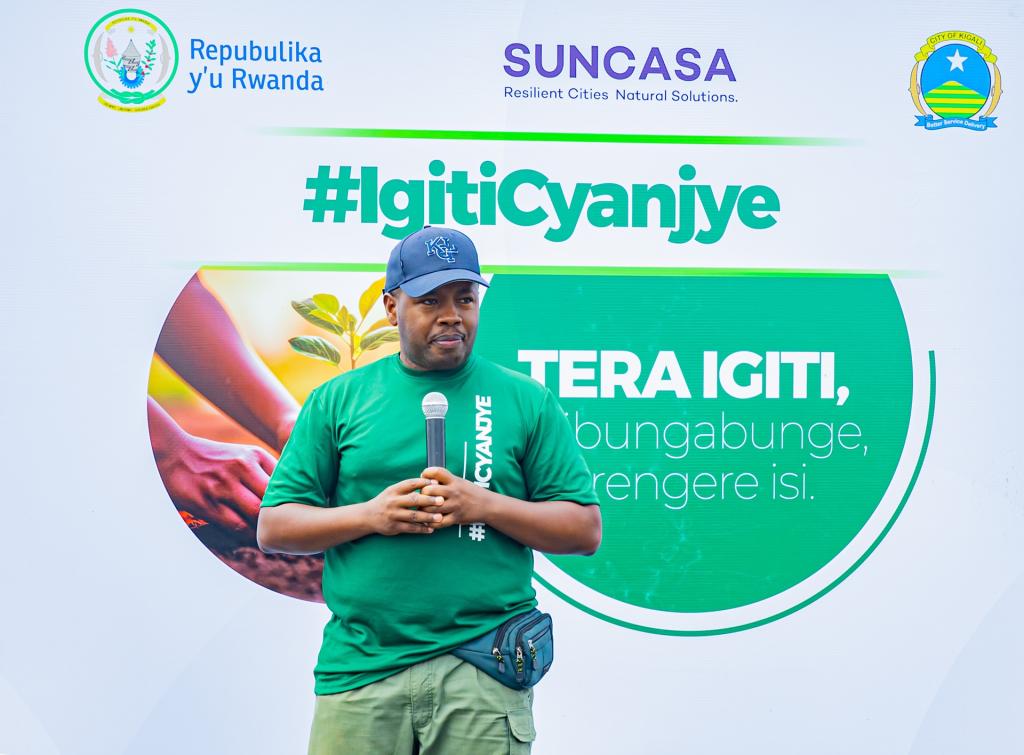
Through various communication channels, the campaign seeks to create a lasting commitment to tree care, positioning Kigali as a green, sustainable city where every individual and organization plays an active role in preserving and nurturing the urban environment. “By leveraging the voices of community champions and influencers, the campaign aims to raise awareness about the environmental, social, and economic benefits of trees while fostering a deep sense of ownership, particularly among Kigali’s residents,” said Lord Mayor Samuel Dusengiyumva.
Through a gender-responsive nature-based solution approach, SUNCASA will see the reforestation of steep slopes, the creation of agroforestry systems, and the establishment of urban tree-planting efforts that will help protect high-risk households, stabilize gullies, and reduce the vulnerabilities associated with Kigali’s rapidly urbanizing topography. In addition to the City of Kigali, SUNCASA is being implemented along with ARCOS Network, AVEGA-Agahozo, and Rwanda Young Water Professionals.
Marc Manyifika, World Resources Institute Lead of Urban Water Resilience for Africa, observed that the ‘My Tree’ campaign and SUNCASA align with global efforts to tackle climate change. “Kigali is leading by example. We cannot ignore the pressing threats of landslides and flooding that affect thousands of households. By working together, we are actively shaping the future we want to see for a greener Kigali. The city is setting a strong example in addressing climate challenges.
Launch of the "#MyTree" community tree planting campaign

Volunteers planting trees as part of the launch of the #MyTree community tree planting campaign on October 26, 2024. (Photo: Willian Bidibura | ARCOS Network | SUNCASA)

Volunteers planting trees as part of the launch of the #MyTree community tree planting campaign on October 26, 2024. (Photo: Willian Bidibura | ARCOS Network | SUNCASA)
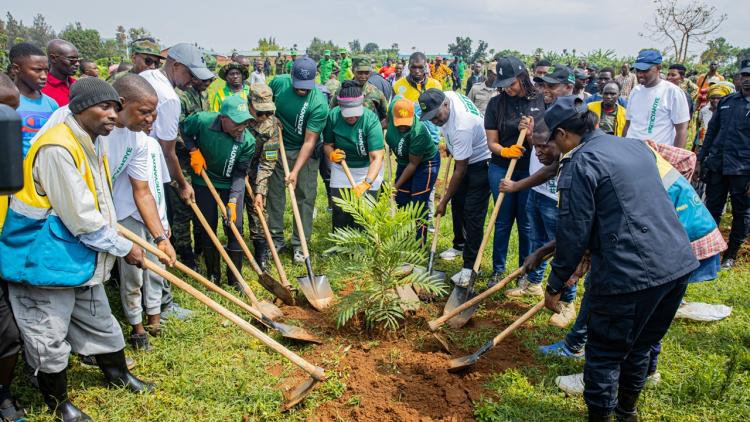
Volunteers planting trees as part of the launch of the #MyTree community tree planting campaign on October 26, 2024. (Photo: Willian Bidibura | ARCOS Network | SUNCASA)
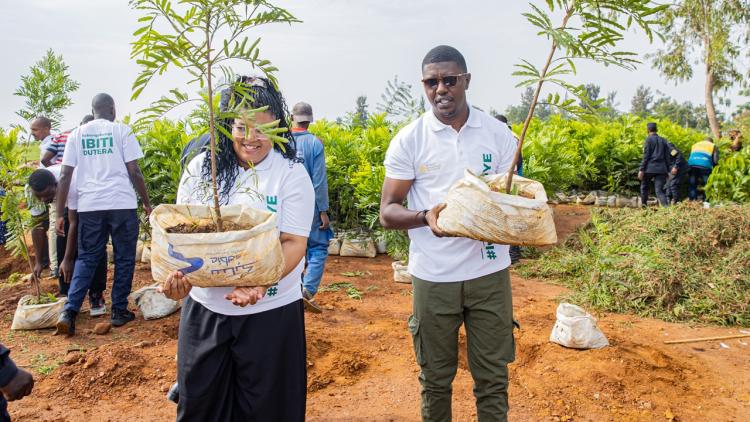
Volunteers planting trees as part of the launch of the #MyTree community tree planting campaign on October 26, 2024. (Photo: Willian Bidibura | ARCOS Network | SUNCASA)
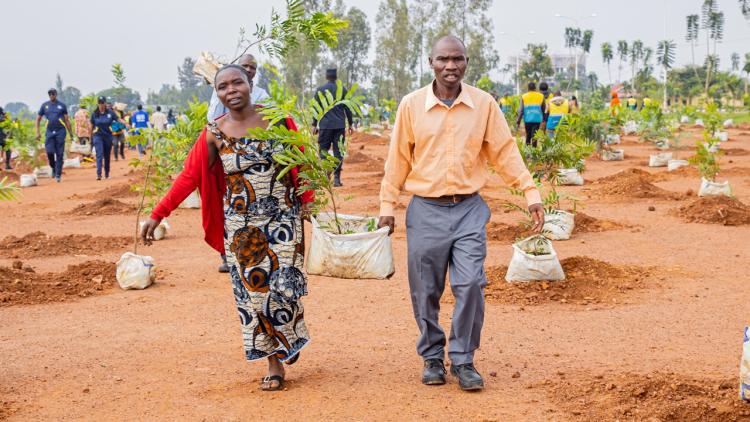
Volunteers planting trees as part of the launch of the #MyTree community tree planting campaign on October 26, 2024. (Photo: Willian Bidibura | ARCOS Network | SUNCASA)
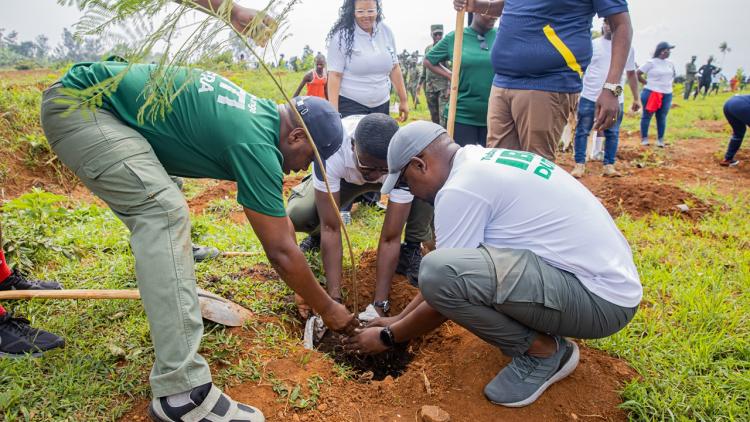
Volunteers planting trees as part of the launch of the #MyTree community tree planting campaign on October 26, 2024. (Photo: Willian Bidibura | ARCOS Network | SUNCASA)
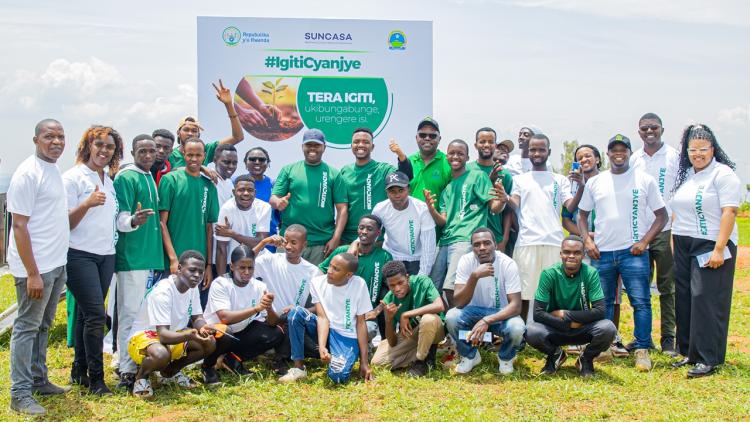
Volunteers planting trees as part of the launch of the #MyTree community tree planting campaign on October 26, 2024. (Photo: Willian Bidibura | ARCOS Network | SUNCASA)
The ‘#IgitiCyanje’ campaign aligns perfectly with SUNCASA’s vision and mission, as it not only promotes tree planting across this vibrant city but also fosters community engagement to ensure the long-term sustainability of the NbS that are making Kigali greener and more resilient to the impacts of climate change,” said Kulupa Mkindlanyana, SUNCASA’s Project Manager representing IISD at the event.
Launch of the #MyTree campaign in the Gasabo District
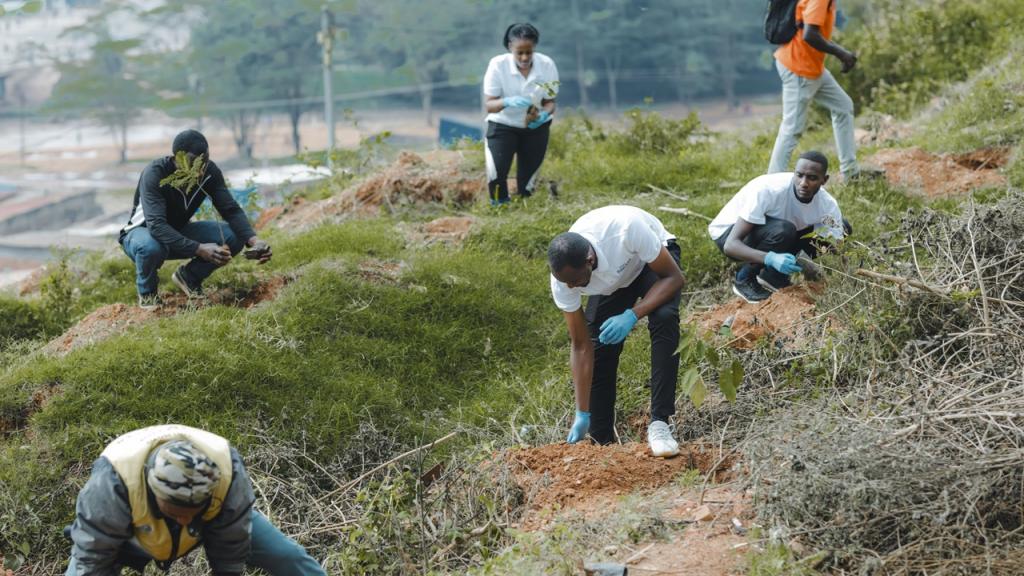
Volunteers planting trees as part of the launch of the #MyTree community tree planting campaign in the Gasabo District on October 26, 2024. (Photo: Rwanda Young Water Professionals | SUNCASA)
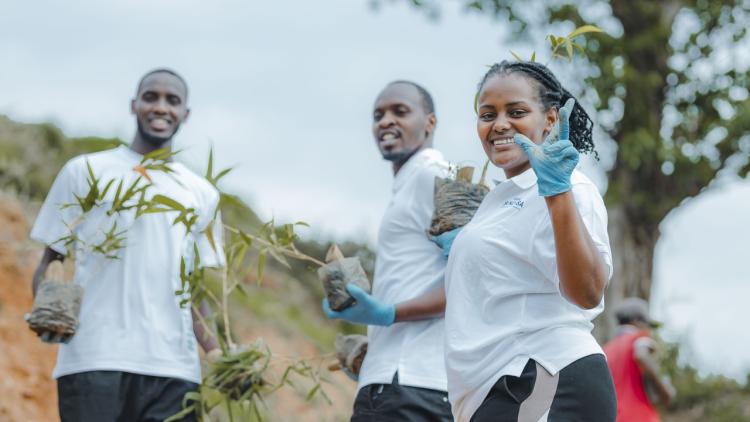
Volunteers planting trees as part of the launch of the #MyTree community tree planting campaign in the Gasabo District on October 26, 2024. (Photo: Rwanda Young Water Professionals | SUNCASA)
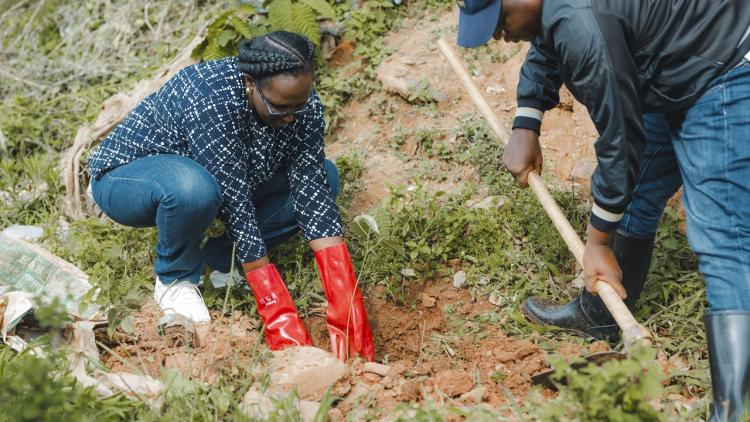
Volunteers planting trees as part of the launch of the #MyTree community tree planting campaign in the Gasabo District on October 26, 2024. (Photo: Rwanda Young Water Professionals | SUNCASA)

Volunteers planting trees as part of the launch of the #MyTree community tree planting campaign in the Gasabo District on October 26, 2024. (Photo: Rwanda Young Water Professionals | SUNCASA)

Volunteers planting trees as part of the launch of the #MyTree community tree planting campaign in the Gasabo District on October 26, 2024. (Photo: Rwanda Young Water Professionals | SUNCASA)
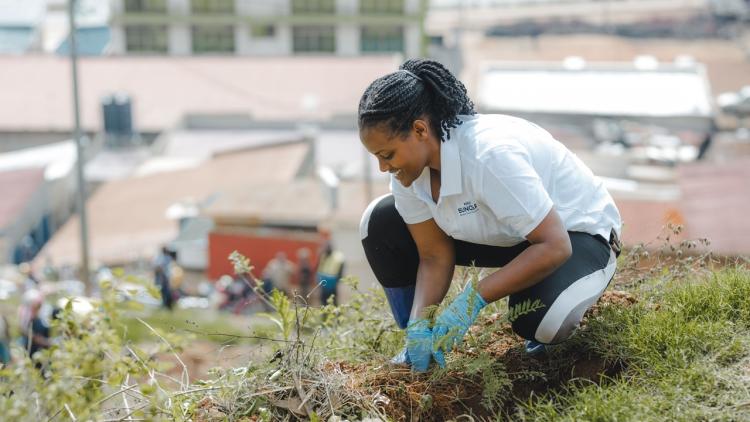
Volunteers planting trees as part of the launch of the #MyTree community tree planting campaign in the Gasabo District on October 26, 2024. (Photo: Rwanda Young Water Professionals | SUNCASA)

Volunteers planting trees as part of the launch of the #MyTree community tree planting campaign in the Gasabo District on October 26, 2024. (Photo: Rwanda Young Water Professionals | SUNCASA)
SUNCASA IN KIGALI
- Investing CAD 9 million (USD 7 million) in gender-responsive nature-based solutions through 2026.
- Enhancing the resilience of 975,000 residents living in climate-risk areas.
- Planting 827,000 trees in 220 ha through afforestation (new forest) actions.
- Reforesting 650 ha with more than 1 million trees.
- Planting 125,000 trees through agroforestry across 1,292 ha.
- Developing 395.6 ha in buffer zones.
- Urban green gardening with the planting of 41,600 trees along 52,488 km of roadways and 43,400 trees in 44.7 ha of public gardens.
- Creating 5,000 green jobs in SUNCASA implementation activities.
ABOUT UMUGANDA
Umuganda, also known as community work with the purpose of contributing to the overall national development, was reintroduced to Rwandan life in 1998 as part of efforts to rebuild the country after the 1994 Genocide against Tusti. It takes place on the last Saturday of each month.
You might also be interested in
SUNCASA Project Overview
The Scaling Urban Nature-based Solutions for Climate Adaptation in Sub-Saharan Africa (SUNCASA) project aims to enhance climate resilience, gender equality and social inclusion, and biodiversity protection in urban communities in Dire Dawa (Ethiopia), Kigali (Rwanda), and Johannesburg (South Africa). Focused on community-level capacity building and leveraging gender-responsive nature-based solutions (NbS), SUNCASA will benefit 2.2 million people living in high-flood-risk areas.
COP 16 in Cali Delivers Key Outcomes for Nature but Questions Remain on Funding
There were some very real wins, and the Colombian government should be applauded for the energy, coordination, and strong sense of community that they brought to the conference as well as to the profile of biodiversity. But the lack of progress on some key negotiation items is concerning.
How to Make Nature-Based Solutions for Adaptation Work for Everyone
Effective nature-based solutions (NbS) for adaptation start with integrated climate risk assessments. These take-aways will help practitioners plan for inclusive and sustainable NbS.
Mainstreaming Gender Equality and Social Inclusion in Nature-Based Solutions for Climate Change Adaptation
Discover tools, recommendations, and case studies on how to plan, design, and implement nature-based solutions for adaptation that advance gender equality and social inclusion while enhancing resilience, biodiversity, and ecosystem integrity.
